Abstract
1. In 13 of 15 experiments, prostaglandin E2 (PGE2) and sulprostone (a prostanoid EP1/EP3-receptor agonist) contracted isolated rings of human pulmonary artery at low concentrations (> or = 5 and > or = 0.5 nM respectively). Tissue was obtained from patients undergoing surgery mainly for carcinoma of the lung. Characterization of the receptors involved was complicated by loss of sensitivity to the contractile PGE action over the experimental period. In contrast, contractile responses to KCl, phenylephrine and the specific thromboxane (TP-) receptor agonist, U-46619, did not decrease with time. 2. The relative contractile potencies for seven PGE analogues, measured during the first few hours after setting up the preparations, were as follows: sulprostone > misoprostol = gemeprost > or = PGE2 > or = GR 63799X > 17-phenyl-omega-trinor PGE2 > or = 11-deoxy PGE1. This ranking indicates that an EP3-receptor is involved. 3. The contractile action of sulprostone was not blocked by the TP-receptor antagonists, EP 169 and GR 32191, and the EP1-receptor antagonist, AH 6809. 4. In two experiments, PGE2 (50 nM) reduced basal tone and sulprostone was a weak contractile agent. Phenylephrine-induced tone was also inhibited by PGE2 (EC50 = 5-20 nM), 11-deoxy PGE1 and butaprost (a selective EP2-receptor agonist); the latter prostanoids were about 2 and 4 times less potent than PGE2 respectively. Interactions with phenylephrine were different in experiments where PGE2 alone was contractile: PGE2 induced contraction superimposed on the phenylephrine response and 11-deoxy PGE1 induced either further contraction or had no effect.(ABSTRACT TRUNCATED AT 250 WORDS)
Full text
PDF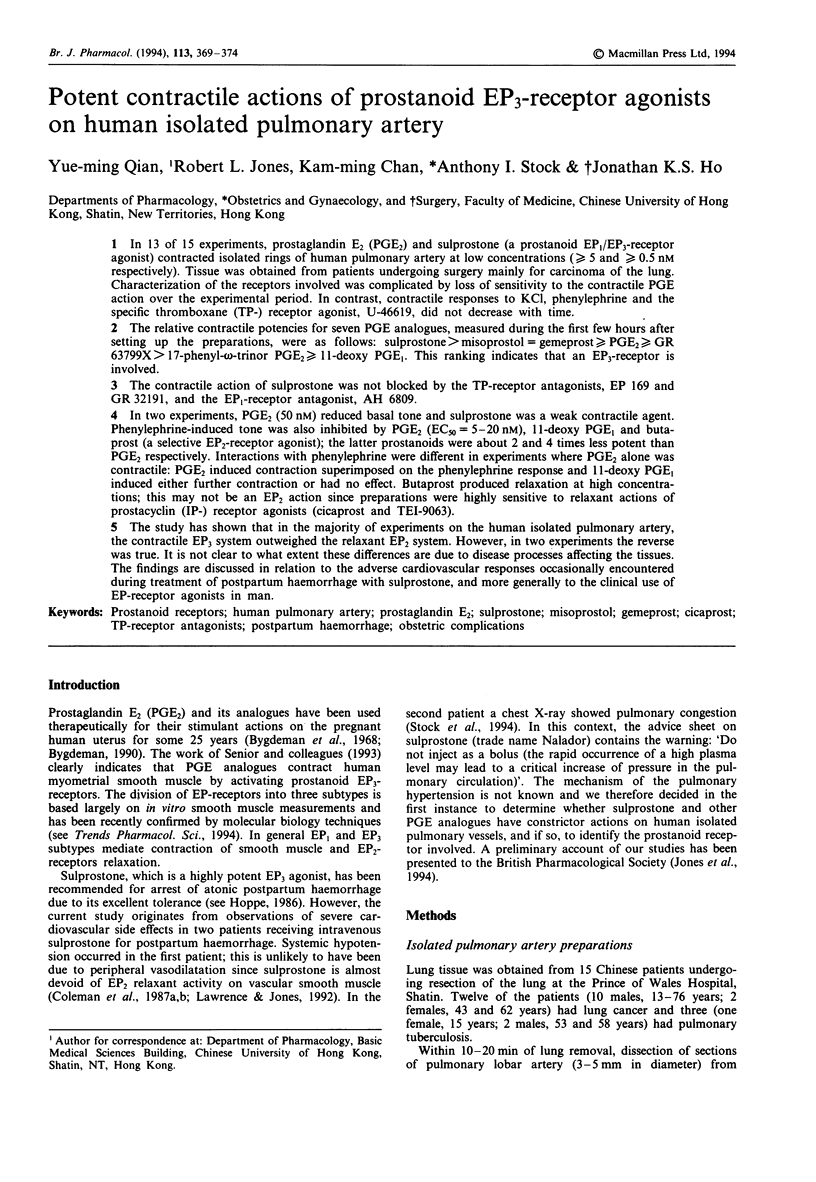
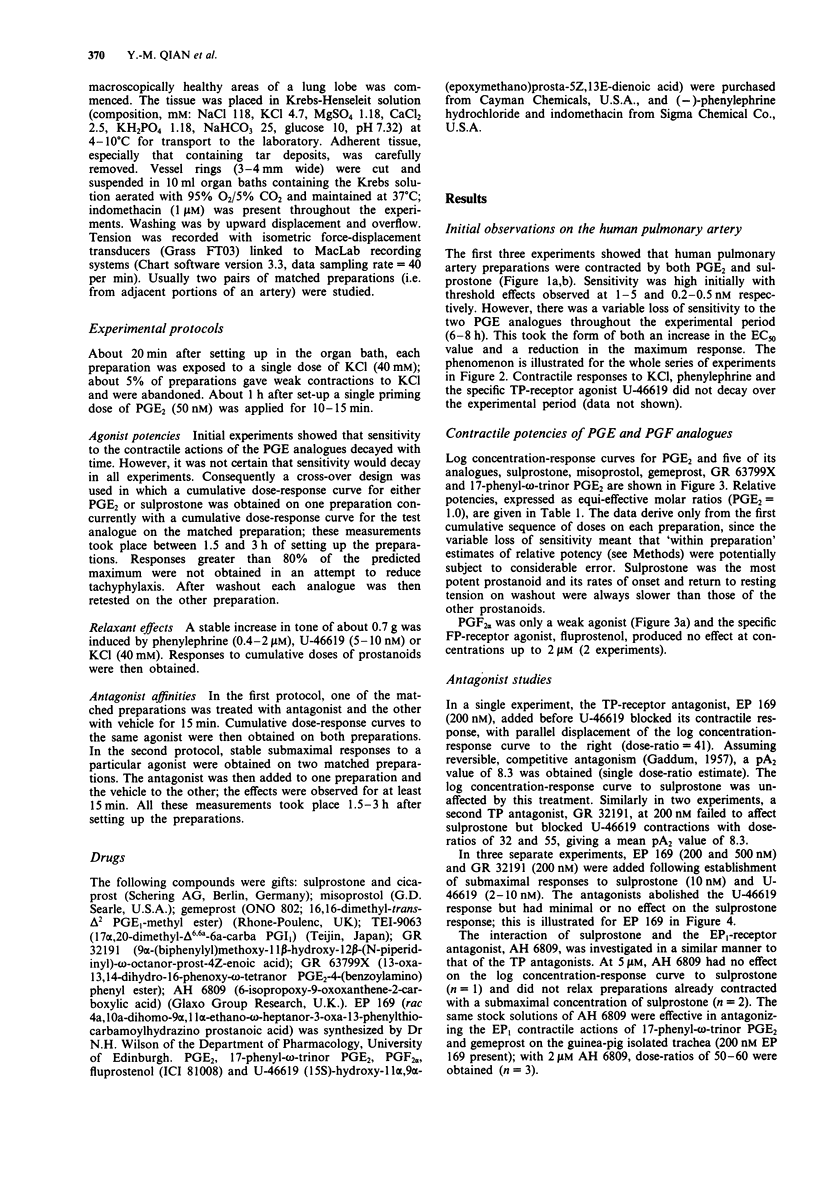
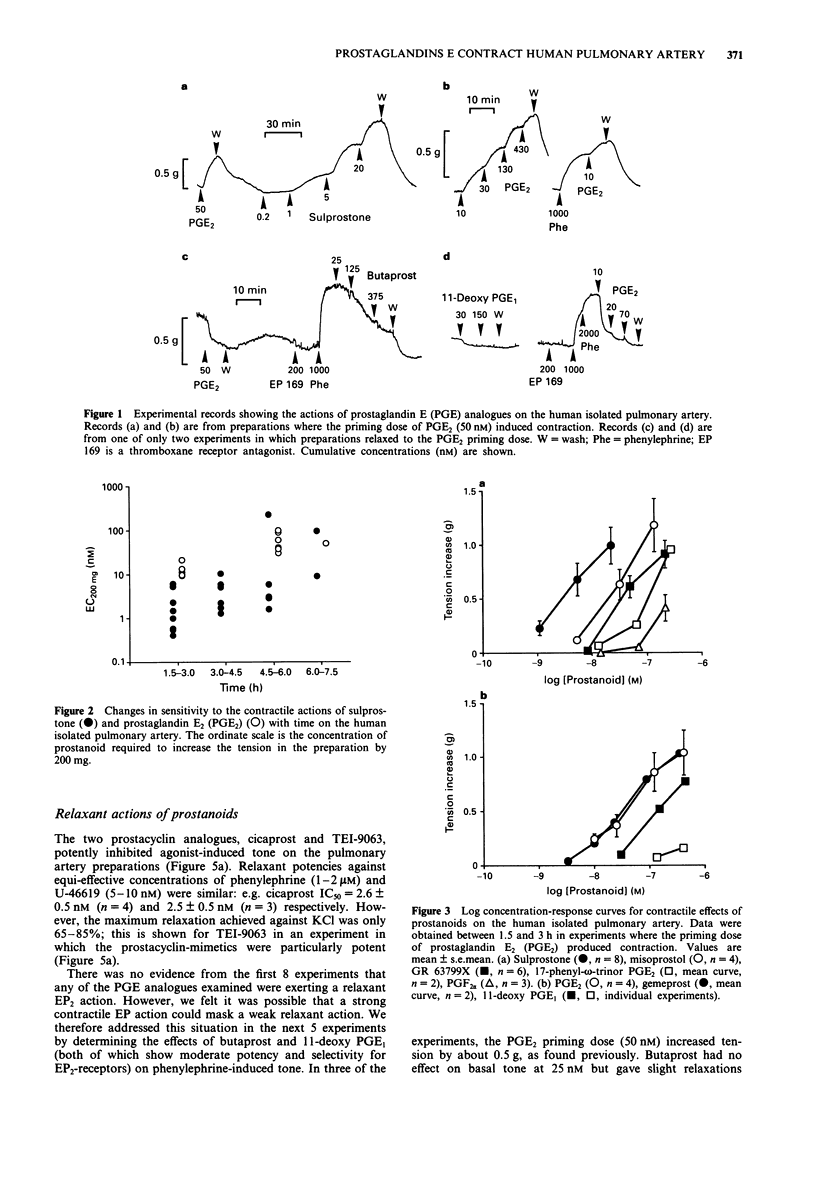
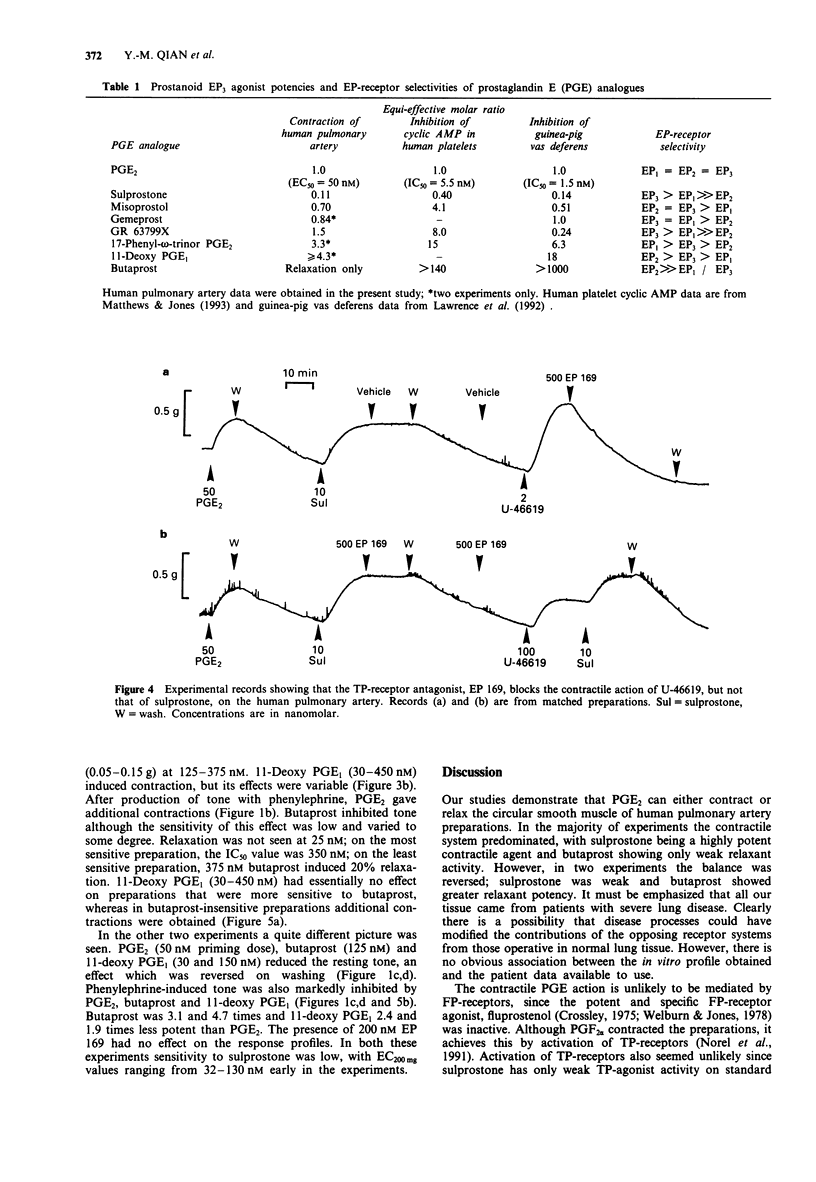
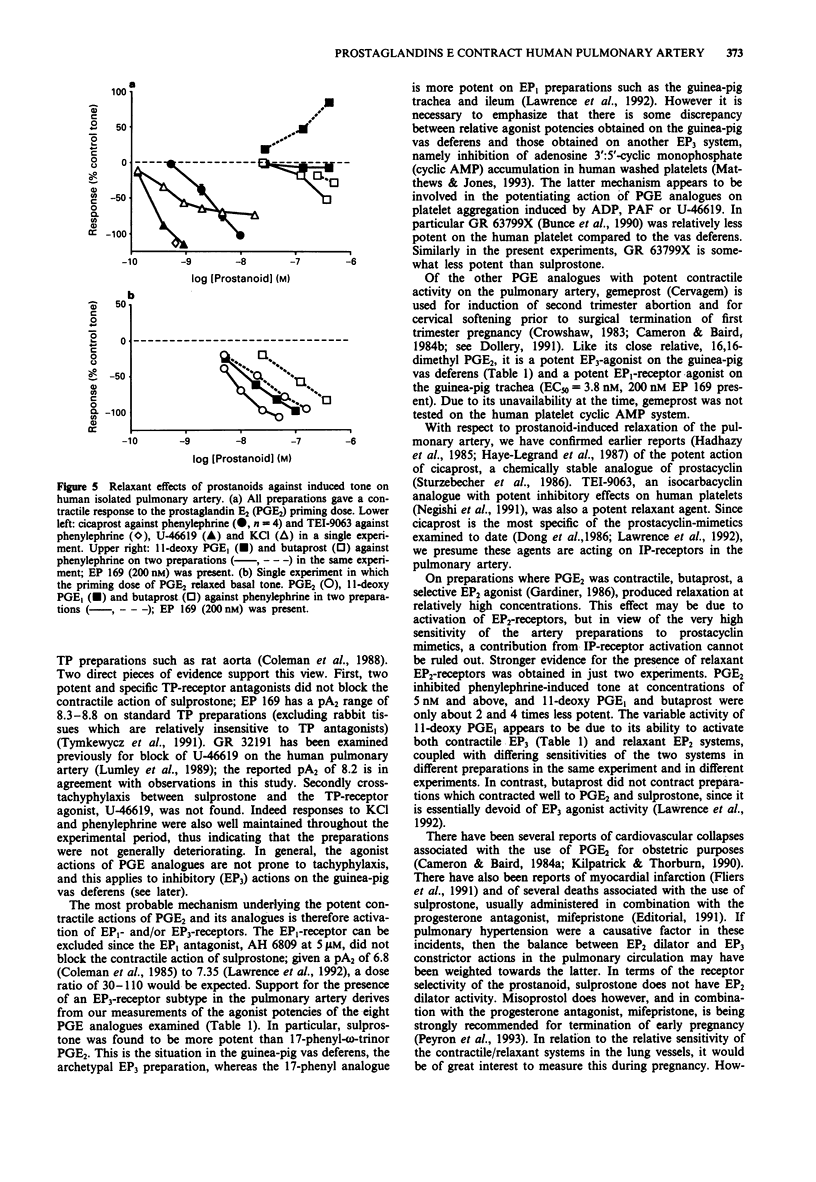
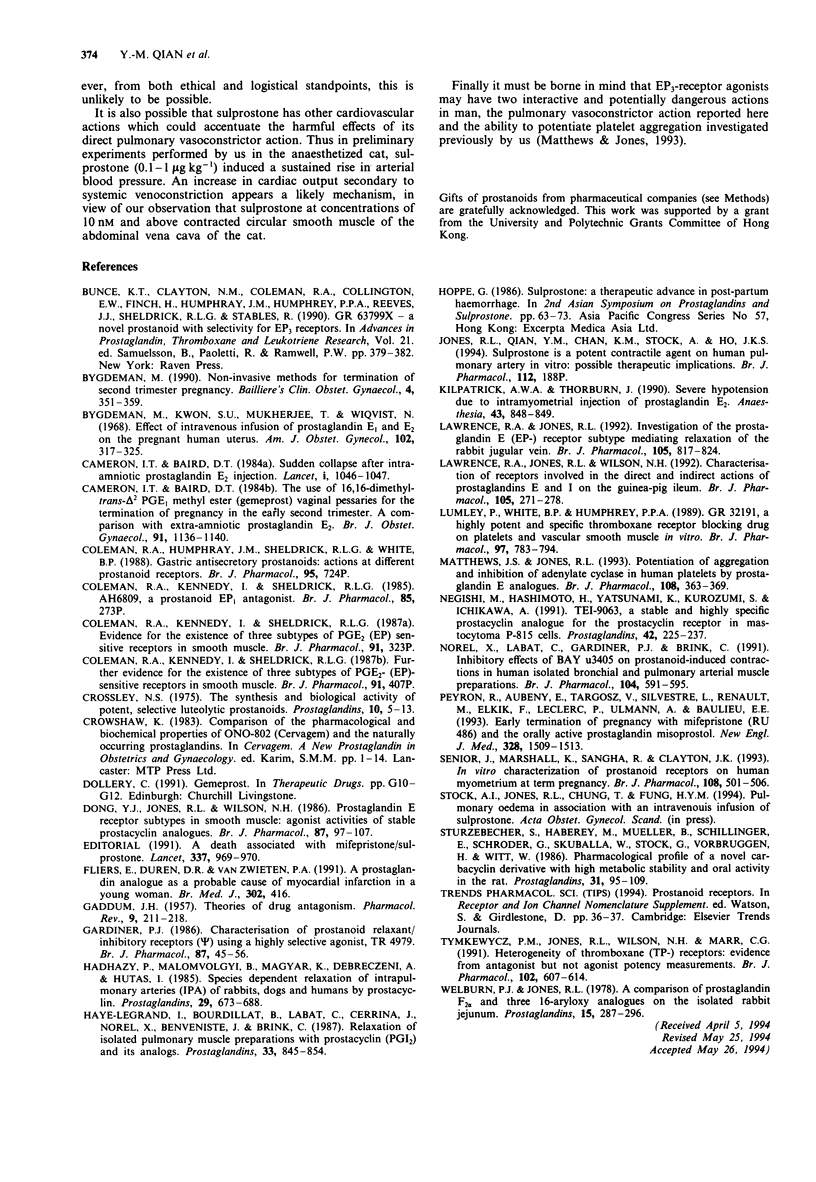
Selected References
These references are in PubMed. This may not be the complete list of references from this article.
- Baldwin H. A., Williams J. L., Snares M., Ferreira T., Cross A. J., Green A. R. Attenuation by chlormethiazole administration of the rise in extracellular amino acids following focal ischaemia in the cerebral cortex of the rat. Br J Pharmacol. 1994 May;112(1):188–194. doi: 10.1111/j.1476-5381.1994.tb13050.x. [DOI] [PMC free article] [PubMed] [Google Scholar]
- Bygdeman M., Kwon S. U., Mukherjee T., Wiqvist N. Effect of intravenous infusion of prostaglandin E1 and E2 on motility of the pregnant human uterus. Prostaglandins and related factors 65. Am J Obstet Gynecol. 1968 Oct 1;102(3):317–326. doi: 10.1016/0002-9378(68)90001-x. [DOI] [PubMed] [Google Scholar]
- Bygdeman M. Non-invasive methods for termination of second trimester pregnancy. Baillieres Clin Obstet Gynaecol. 1990 Jun;4(2):351–359. doi: 10.1016/s0950-3552(05)80231-7. [DOI] [PubMed] [Google Scholar]
- Cameron I. T., Baird D. T. The use of 16,16-dimethyl-trans delta 2 prostaglandin E1 methyl ester (gemeprost) vaginal pessaries for the termination of pregnancy in the early second trimester. A comparison with extra-amniotic prostaglandin E2. Br J Obstet Gynaecol. 1984 Nov;91(11):1136–1140. doi: 10.1111/j.1471-0528.1984.tb15090.x. [DOI] [PubMed] [Google Scholar]
- Crossley N. S. The synthesis and biological activity of potent, selective luteolytic prostaglandins. Prostaglandins. 1975 Jul;10(1):5–18. doi: 10.1016/0090-6980(75)90090-8. [DOI] [PubMed] [Google Scholar]
- Dong Y. J., Jones R. L., Wilson N. H. Prostaglandin E receptor subtypes in smooth muscle: agonist activities of stable prostacyclin analogues. Br J Pharmacol. 1986 Jan;87(1):97–107. doi: 10.1111/j.1476-5381.1986.tb10161.x. [DOI] [PMC free article] [PubMed] [Google Scholar]
- Fliers E., Düren D. R., van Zwieten P. A. A prostaglandin analogue as a probable cause of myocardial infarction in a young woman. BMJ. 1991 Feb 16;302(6773):416–416. doi: 10.1136/bmj.302.6773.416-a. [DOI] [PMC free article] [PubMed] [Google Scholar]
- GADDUM J. H. Theories of drug antagonism. Pharmacol Rev. 1957 Jun;9(2):211–218. [PubMed] [Google Scholar]
- Gardiner P. J. Characterization of prostanoid relaxant/inhibitory receptors (psi) using a highly selective agonist, TR4979. Br J Pharmacol. 1986 Jan;87(1):45–56. doi: 10.1111/j.1476-5381.1986.tb10155.x. [DOI] [PMC free article] [PubMed] [Google Scholar]
- Hadházy P., Malomvölgyi B., Magyar K., Debreczeni L. A., Hutás I. Species dependent relaxation of intrapulmonary arteries (IPA) of rabbits, dogs and humans by prostacyclin. Prostaglandins. 1985 May;29(5):673–688. doi: 10.1016/0090-6980(85)90129-7. [DOI] [PubMed] [Google Scholar]
- Haye-Legrand I., Bourdillat B., Labat C., Cerrina J., Norel X., Benveniste J., Brink C. Relaxation of isolated human pulmonary muscle preparations with prostacyclin (PGI2) and its analogs. Prostaglandins. 1987 Jun;33(6):845–854. doi: 10.1016/0090-6980(87)90113-4. [DOI] [PubMed] [Google Scholar]
- Higenbottam T., Wheeldon D., Wells F., Wallwork J. Long-term treatment of primary pulmonary hypertension with continuous intravenous epoprostenol (prostacyclin). Lancet. 1984 May 12;1(8385):1046–1047. doi: 10.1016/s0140-6736(84)91452-1. [DOI] [PubMed] [Google Scholar]
- Kilpatrick A. W., Thorburn J. Severe hypotension due to intramyometrial injection of prostaglandin E2. Anaesthesia. 1990 Oct;45(10):848–849. doi: 10.1111/j.1365-2044.1990.tb14569.x. [DOI] [PubMed] [Google Scholar]
- Lawrence R. A., Jones R. L. Investigation of the prostaglandin E (EP-) receptor subtype mediating relaxation of the rabbit jugular vein. Br J Pharmacol. 1992 Apr;105(4):817–824. doi: 10.1111/j.1476-5381.1992.tb09063.x. [DOI] [PMC free article] [PubMed] [Google Scholar]
- Lawrence R. A., Jones R. L., Wilson N. H. Characterization of receptors involved in the direct and indirect actions of prostaglandins E and I on the guinea-pig ileum. Br J Pharmacol. 1992 Feb;105(2):271–278. doi: 10.1111/j.1476-5381.1992.tb14245.x. [DOI] [PMC free article] [PubMed] [Google Scholar]
- Lumley P., White B. P., Humphrey P. P. GR32191, a highly potent and specific thromboxane A2 receptor blocking drug on platelets and vascular and airways smooth muscle in vitro. Br J Pharmacol. 1989 Jul;97(3):783–794. doi: 10.1111/j.1476-5381.1989.tb12017.x. [DOI] [PMC free article] [PubMed] [Google Scholar]
- Matthews J. S., Jones R. L. Potentiation of aggregation and inhibition of adenylate cyclase in human platelets by prostaglandin E analogues. Br J Pharmacol. 1993 Feb;108(2):363–369. doi: 10.1111/j.1476-5381.1993.tb12810.x. [DOI] [PMC free article] [PubMed] [Google Scholar]
- Negishi M., Hashimoto H., Yatsunami K., Kurozumi S., Ichikawa A. TEI-9063, a stable and highly specific prostacyclin analogue for the prostacyclin receptor in mastocytoma P-815 cells. Prostaglandins. 1991 Sep;42(3):225–237. doi: 10.1016/0090-6980(91)90112-s. [DOI] [PubMed] [Google Scholar]
- Norel X., Labat C., Gardiner P. J., Brink C. Inhibitory effects of BAY u3405 on prostanoid-induced contractions in human isolated bronchial and pulmonary arterial muscle preparations. Br J Pharmacol. 1991 Nov;104(3):591–595. doi: 10.1111/j.1476-5381.1991.tb12474.x. [DOI] [PMC free article] [PubMed] [Google Scholar]
- Peyron R., Aubény E., Targosz V., Silvestre L., Renault M., Elkik F., Leclerc P., Ulmann A., Baulieu E. E. Early termination of pregnancy with mifepristone (RU 486) and the orally active prostaglandin misoprostol. N Engl J Med. 1993 May 27;328(21):1509–1513. doi: 10.1056/NEJM199305273282101. [DOI] [PubMed] [Google Scholar]
- Senior J., Marshall K., Sangha R., Clayton J. K. In vitro characterization of prostanoid receptors on human myometrium at term pregnancy. Br J Pharmacol. 1993 Feb;108(2):501–506. doi: 10.1111/j.1476-5381.1993.tb12832.x. [DOI] [PMC free article] [PubMed] [Google Scholar]
- Stürzebecher S., Haberey M., Müller B., Schillinger E., Schröder G., Skuballa W., Stock G., Vorbrüggen H., Witt W. Pharmacological profile of a novel carbacyclin derivative with high metabolic stability and oral activity in the rat. Prostaglandins. 1986 Jan;31(1):95–109. doi: 10.1016/0090-6980(86)90228-5. [DOI] [PubMed] [Google Scholar]
- Tymkewycz P. M., Jones R. L., Wilson N. H., Marr C. G. Heterogeneity of thromboxane A2 (TP-) receptors: evidence from antagonist but not agonist potency measurements. Br J Pharmacol. 1991 Mar;102(3):607–614. doi: 10.1111/j.1476-5381.1991.tb12220.x. [DOI] [PMC free article] [PubMed] [Google Scholar]
- Welburn P. J., Jones R. L. A comparison of prostaglandin F2alpha and three 16-aryloxy analogues on the isolated rabbit jejunum. Prostaglandins. 1978 Feb;15(2):287–296. doi: 10.1016/0090-6980(78)90168-5. [DOI] [PubMed] [Google Scholar]


